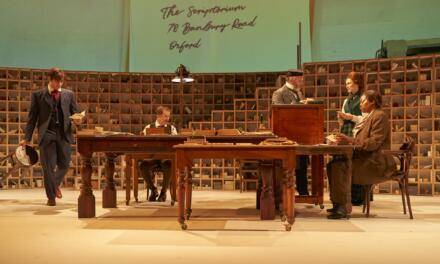A cast of young actors from diverse parts of the globe brought Malvolio’s Fantasy to the Space venue at this year’s Edinburgh Fringe. The group, members of Edinburgh University’s Shakespeare Company, developed the play from an initial twenty-minute showcase last January. As I was waiting on line to see the show, I overheard snippets of conversation from people who had seen the showcase and expectations were running high, proof that a creative process in two stages can be an excellent marketing strategy. According to the press release, Malvolio’s Fantasy is an original retelling filled with camp, ego and mustaches”, suggesting audiences are in for a lot of fun. In fact, in the Dramatis Personae of the Shakespeare play Malvolio is indicated as Countess Olivia’s Steward, in the present version writers and directors, Zusa Sołtykowska and Isabella Olsen-Barone, have audaciously reshaped him, placing him center stage. From the opening scene, we find him talking to Lady Olivia’s servant, Mary Acoster (in Shakespeare, Countess Olivia has a gentlewoman called Maria). Dressed in a flamboyant, yellow costume, Malvolio (Zac Askham) comes over as massively ambitious and determined to make it with Duke Orsino (Aodhan Mallon) and not Olivia (Rebecca Morgan) as in the original. The two discuss their lowly social condition, and Mary (Zuza Soltykowska), like Malvolio, is dreaming big, in this case for her daughter Carmen (Isabella Olsen-Barone), flaunting a glitzy dress and bright, frizzy wig. Viola (Isabella Velarde), disguised as Cesario, complete with a large mustache, starts coming on to Olivia, who quickly discovers Cesario is a woman and immediately falls for her. Throughout, the emphasis is on gender bending and camp, and in the end, Olivia and Viola get together as do Orsino and Malvolio. Class and gender count for little in the world of this play; a steward can marry a lord, and Olivia marries a commoner, rather than Duke Orsino. Four original songs, produced by Claire Wang and Magda Olech, punctuate the show, providing moments of romantic tranquillity in what is an otherwise fast-paced, at times over-noisy production. The tremendous energy and camp humour were well received by an enthusiastic audience of all ages. In around 1600 when Shakespeare penned Twelfth Night, censorship and a strict moral code doubtless prevented him ending the comedy with two gay marriages, while today this radical modern feminist retelling can do just that. On the opening night when I saw the play, some scene changes, entrances and exits, and lighting cues proved cumbersome, slowing down the action, and detracting one’s attention from the story, issues which will hopefully be resolved in the rest of the run.

Malvolio’s Fantasy, at the Edinburgh Fringe 2024. Edinburgh University’s Shakespeare Company, written and directed by Zusa Sołtykowska and Isabella Olsen-Barone.
This post was written by the author in their personal capacity.The opinions expressed in this article are the author’s own and do not reflect the view of The Theatre Times, their staff or collaborators.
This post was written by Margaret Rose.
The views expressed here belong to the author and do not necessarily reflect our views and opinions.


![“Peer Gynt” [recycled] by Auckland Theatre Company](https://thetheatretimes.com/wp-content/uploads/2017/03/Gynt_antlers-440x264.jpg)















